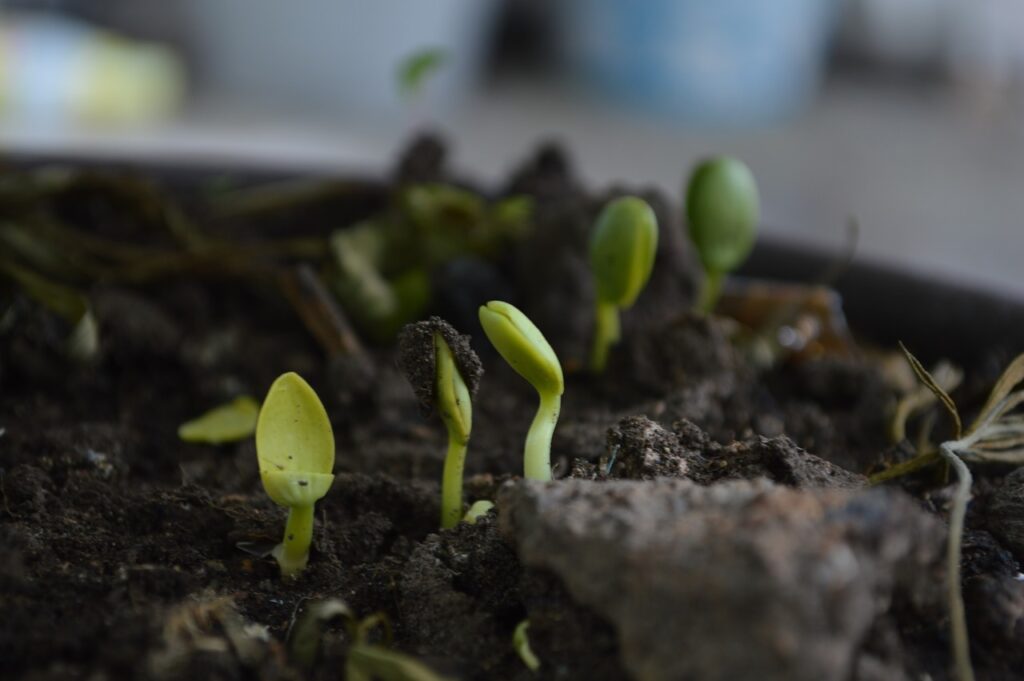It is normal to be astonished at the marvels of the back gold!
As gardeners, we all know that compost provides massive advantages when we use it in our potting mixes, and if it is such an excellent soil amendment, why can’t we just use compost instead of soil for growing plants?
Owing to the bulk of benefits compost provides to the plants, any gardener would wonder about planting directly into compost.
But, can you? Can you plant directly into compost? Well…today, we will find an answer to this question.
On that note, stay with me until the very end. Enjoy!
Can You Plant Directly Into Compost?
So, can we plant directly into compost?
Yes, and No!
Yes, if you are planting suitable plants in properly cooked compost, and No, if you are planting unsuitable plants in improperly cooked compost.
Now, what is “properly cooked” compost, and what are the “suitable plants” that can be grown in compost alone?
Don’t worry! Let me enlighten you with these puzzling terms.
Properly Cooked Compost
As the name reflects, properly cooked compost is one that’s prepared under strict observation and good maintenance.
Good maintenance and proper compost cooking require extensive aeration, the right temperature, adequate moisture, and a sufficient period for the composting mixture to mature.
Maturity of the Compost
Mature compost is the one that has been entirely bio-degraded and has a high percentage of humus content.
The composting mixture that has not been completely decomposed would still have microbes working in it. These microbes require nutrients to dwell and compete with the plants you grow in this compost.
That’s why improperly cooked or unfinished compost can cause more harm than good to your plants! It could be anaerobic, acidic, or even deprived of nutrients.
Therefore, even if you are planting directly into compost, please ensure you use high-quality, properly cooked, and finished compost. A good quality compost appears rich in dark brown color, has a sweet, earthly smell, and crumbles in hand.
Suitable Plants
Not all plants can grow in compost alone.
The plants that can be grown in properly conditioned and mature compost are termed suitable plants. More on that in a bit.
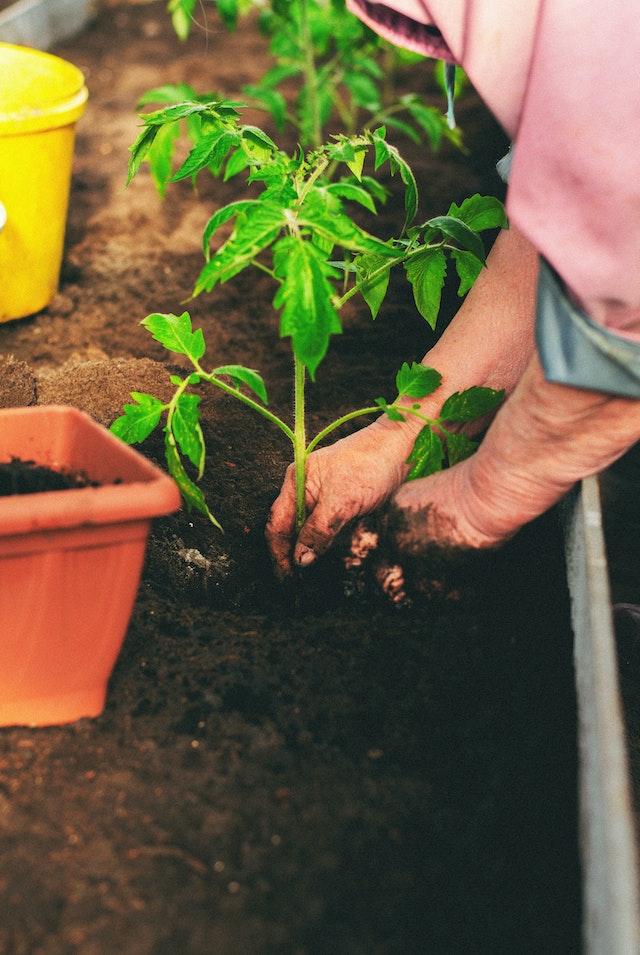
Can Plants Grow in Compost Only?
As I mentioned earlier, there are actually both possibilities.
Although it is definitely doable, most experts don’t recommend growing plants directly into compost if it’s not purely for experimental purposes.
Generally, planting directly into compost is not a good idea because compost, though filled with ample amounts of organic nutrients, lacks essential mineral nutrients required for proper plant growth.
However, some plants can actually pull this off! As I said, not all plants can grow in compost alone, but some plants, known as “heavy feeders,” can be grown directly in compost.
What kind of plants can you plant directly into compost? You need to know certain conditions before growing a plant in compost alone.
They are:
Nature of the Plants
The nature of the plant plays a crucial role in determining whether it can grow only in compost. Compost is filled with organic nutrients, making it a suitable medium for heavy feeders.
Heavy feeders are the type of plants that have high nutrient needs. They include tomatoes, peppers, squash, cucumbers, etc.
Such plants can do pretty well, even if grown solely in compost.
In addition to this character, one must look at the size and height of the plant as well. Tall and heavy plants are not suitable for growing in compost alone.
As you know, compost is relatively lighter than soil. Therefore, if you plant tall or heavy plants directly into compost, they will find it challenging to stand erect. Also, the roots won’t be able to anchor to the wobbly structure of the compost.
Hence, if you want to plant some plants directly into compost, ensure that you pick the right ones!
Moisture Needs
Everybody knows how excellent compost works as an amendment to heavy soil. Compost is one of the best options for increasing soil drainage while keeping nutrients balanced.
Due to its light and airy texture, compost doesn’t retain much water, and it can be bad for plants that require plenty of water.
Although compost acts like a sponge when absorbing the water, it dries out as quickly as it gets wet because there is nothing to hold the water inside.
Acidity
Plants that love acidic soil are suitable to grow in compost.
The acidity of the compost depends upon its maturity. More mature compost will be less acidic and vice versa.
Most heavy feeders love a slightly acidic medium; that is why they can grow in compost alone. Most vegetables, however, grow best in neutral pH ranging between 6–7.
Using anaerobic compost to root your plants will cause damage because it is highly acidic for any kind of plant. You can check the pH levels of the compost using a pH meter.
Heat Tolerance
Heat tolerance is another element you should consider if you consider planting directly into the compost.
As I’ve mentioned earlier, using matured compost is better if you want to grow some plants in compost alone. But why’s that?
In addition to not being very acidic and innutritious, matured compost produces much less heat.
Breaking down compostable organic material into humus produces heat which increases the temperature of the composting pile. If you use unfinished compost to grow your plants, it can increase the temperate around the roots.
Still, even if you use mature compost, please ensure the plant’s roots are heat tolerant.
Can you plant it directly into compost? Yes, but keep all of the above factors in mind. Now, let’s see what exactly you can plant directly in compost.
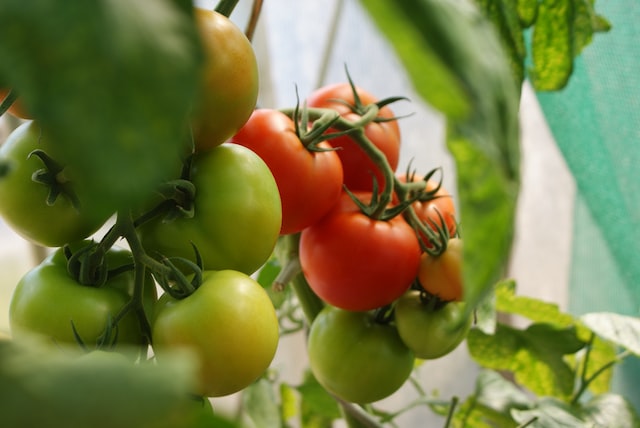
What Can You Plant Directly in Compost?
Now that you can be prudent while picking up the plants, let’s see what you can plant directly into compost.
Again, I’ll say that it’s not the best idea to plant your veggies directly into compost unless you are doing it for experimental purposes, and you’ll be okay if you end up with nothing.
However, if you have everything in check, here’s a little help.
Growing Vegetables in Pure Compost
As I mentioned before, some vegetables can be grown directly into compost.
They include:
- Tomatoes
- Cucumbers
- Peppers
- Pumpkins
- Squash
- Broccoli
- Cauliflower
- Cabbage
- Zucchini
- Watermelon
- Eggplant
All the plants mentioned above are heavy feeders and have a brief growing period. Therefore, they quickly use up the nutrients present in the compost.
Moreover, you can grow baby carrots and spring onions in pure compost as these plants are lighter in weight and would not topple over.
However, pure compost will dry out quickly; therefore, you’ll need to water it frequently.
Compaction is another thing you’ll need to take care of while growing plants in compost. (I’ve elaborated on it further in the article.)
Now, let’s see if we can grow seeds in compost alone.
Can You Grow Seeds in Compost?
Similar to growing plants in compost, growing seeds also require proper conditions.
- As you might know already, compost has many beneficial microbes, but in addition to these microbes, compost can also have harmful pathogens.
This happens when the compost is not properly cooked under high temperatures. A composting mixture requires a temperature of at least 60°C (140°F) to kill all the harmful pathogens that can harm the plants. This problem is usually prevalent in homemade compost.
- Immature compost won’t have sufficient nitrogen content for sprouting seeds.
As the dwelling microbes feed on organic matter, they compete with the plants or seedlings planted in the compost for nutrients. Sometimes, they might even consume the seeds as a source of nutrients.
- Anaerobic compost is not suitable for seeds or seedlings. It doesn’t have air circulation and can suffocate the seedlings. Moreover, anaerobic compost can become soggy, ultimately causing roots to rot!
Besides, as is common in anaerobic compost, you’ll need to take care of the excessive build-up of organic acids that are detrimental to the seeds.
- And lastly, you’ll need to be sure that the compost you are using is not poisoned with pesticides or herbicides.
The problem is not so rampant if you made your compost at home because you would know if you added chemically treated ingredients, but one can’t be sure while using commercial compost.
Also, if you are using store-bought compost, check the packaging to see if there are any added fertilizers because overly fertilized compost will also harm the seeds.
Most experts don’t recommend growing seedlings in compost alone, as the chances of succeeding are pretty low, but if you have all of the above things in check and you feel like experimenting, you can definitely give it a shot!
Starting seeds in pure compost is not very challenging because seeds only require adequate moisture to sprout.
However, once the roots the formed, they seek nutrients from the surrounding medium.
That aside, let’s see why we can’t use compost alone to grow our plants.
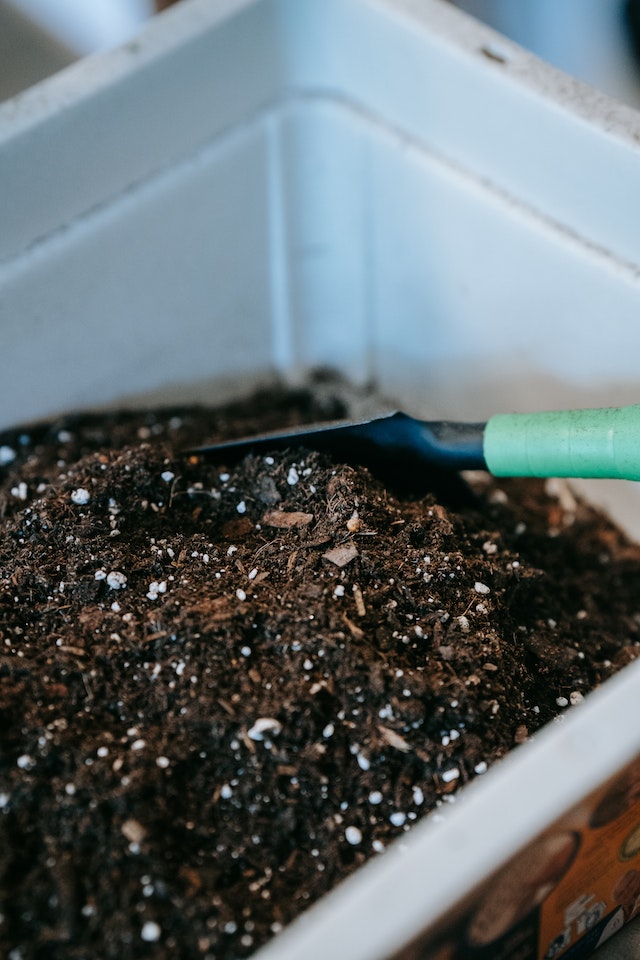
Compost vs. Soil | What Is Compost Missing?
A good potting mixture is the one that:
- Can retain moisture.
- Can drain well.
- Has suitable pH.
- Has balanced nutrients.
Let’s see what compost is missing.
Water Retention
As you know, when used alone, compost is not good at retaining moisture.
Therefore, if you grow plants directly into compost, you’ll need to water them quite often. Otherwise, they can get prone to underwatering.
Also, compost is fluffier when it’s dry. So, the roots won’t be able to hold up, and the plants can topple over.
Stability
Compost lacks structural stability!
Compost, being much lighter than soil, doesn’t have the strength to hold big plants. Plants’ roots need a sturdy base to anchor themselves, and compost can’t provide one.
And the reason why water just effortlessly seeps down through pure compost is because of this softness.
Balance of Nutrients
Compost, while having certain nutrients in excess, lacks in others.
Although compost is well-known for its nutritious value, it doesn’t contain a balance. And balance is the most important thing for a plant’s growth.
In compost, some nutrients that are present in excess are only needed in minor quantities by the plants. On the other hand, some essential nutrients for plant growth are not even present in the compost.
Using the wrong type of compost can cause excess ammonia build-up and salinity. That is mostly caused when you use compost made up of animal manure.
Therefore, compost is best as an amendment, not a replacement.
Compaction
Compost breaks down over time.
Hence, if you are using pure compost to grow your plants, you’ll need to recover it after some time.
Moreover, due to its light and fluffy texture, compost can quickly get compacted. This can reduce the air spaces around the roots, causing them to suffocate.
Compaction also results in waterlogging, ultimately leading to fungal diseases such as root rot.
That was all about how can you plant directly into compost and why you can’t. Now, let’s see how compost can help you as a gardener.
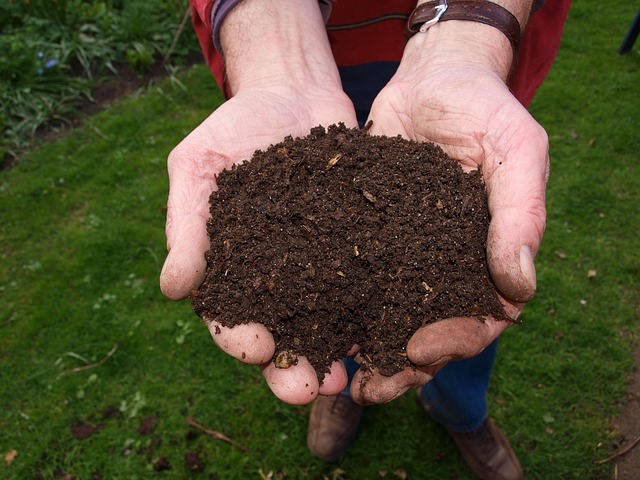
How Compost Will Help Your Garden?
You don’t get a name like “black gold” if you’re not worth it. So, everybody knows how valuable compost is when it comes to gardening.
However, if you are not experimenting with using only compost to grow your plants, here are some common ways you can use it in your garden.
As a Soil Amendment
As mentioned above, compost is the go-to component for increasing soil aeration and drainage while filling it with healthy nutrients.
Mixing compost with potting soil will enhance the soil’s structure and condition it for better plant growth.
Also, adding compost to the soil will help to retain nutrients that are otherwise leached out with water. If you are using compost in raised beds, it will ensure the gradual release of nutrients over an extended period of time.
Using 25% to 30% of compost in a soil blend is recommended.
Ideally, you can add 2–4 inches of compost layer on top of your garden beds. You can mix it using a garden rake or leave it as it is.
As Mulch
Mulching is another way of utilizing compost in your garden.
Mulching spreads mulch (typically made up of dead leaves and wood chips) over the ground to keep the soil moist, protect plants from heat or cold, and control weeds.
We can use compost as an excellent alternative to mulch.
Just apply a thick layer, 3–4 inches, of compost around plants, trees, shrubs, or flower beds. Over time, just like mulch, this compost layer will break down and provide the soil underneath with nutrients.
Ever Heard of Compost Tea?
Compost tea is liquid compost.
Although it doesn’t provide as many benefits as compost does itself, it can still be used as a good source of water-soluble nutrients and beneficial microorganisms.
Water-soluble nutrients present in the compost tea are readily available to the plants. Moreover, adding compost tea to your soil mix can increase the growth of beneficial microbes that help germinate seeds and develop roots.
However, overuse of compost tea can cause plant problems. You can use compost tea every 30 days during growing seasons.
Can You Use Compost Instead of Topsoil?
Generally, compost is not used as an alternative to topsoil.
I would recommend mixing it up with the topsoil as it provides you with miracles of results. Mixing compost with topsoil (just general garden soil) can boost the soil’s quality.
However, if you still want to use compost as topsoil, you should grind it to a fine texture.
That would be all!
Conclusion
To conclude the talk, I must say that if you want to take maximum advantage of the “black gold,” use it just as an amendment.
Although it is possible to plant directly into compost, it’s better not to try it if not doing it for experimental purposes.
A summary:
- We looked at the two possibilities of planting directly into compost.
- We saw what kind of compost is more suitable for growing plants and what kind of plants can grow in compost alone.
- We saw what compost is missing as compared to the soil and why it is better to use it just as an amendment.
- Finally, we got to know some of the most valuable methods to utilize compost in a beneficial way for our garden.
